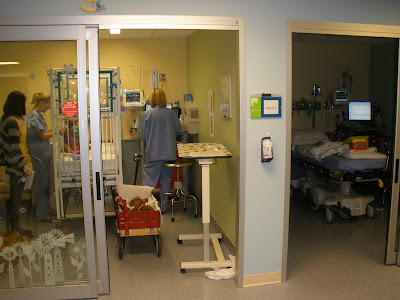Last night I read this article in Jezebel (which I'm warning you is predictably, um, blunt, especially in the combox) about a recent study which revealed that women's sexuality is often negatively impacted by hormonal birth control. The author of the piece references the fact that we women just can't seem to win, that in attempting to avoid pregnancy we come up short in some way--either unable to experience the pleasure we would wish to, or in exposing ourselves to undue risk. All the while of course, men remain more or less unaffected and get to experience sex consequence-free, per the usual.
And, it's all really kind of true.
Back before I had any sort of religious or moral objections to artificial birth control, I used that pesky pill myself. And I did experience a variety of terrible, no-good-very-bad side effects, including some of the very ones listed by researchers in the aforementioned study. I also had horrible headaches, and emotional issues too. And when it became clear that my body was not going to simply "adjust" in some matter of time, I threw the pills in the trash. I told myself I could try a different, lower-dose pill in the future in hopes of having better results.
But then I heard about the potential abortifacient effects of hormonal birth control, and knew that it was officially no longer an option for me. Sigh.
Truth be told, I actually felt irritated and highly inconvenienced, and distinctly remember thinking, What are we going to do? I felt like there really weren't any great solutions to the "problem" of fertility, to the big riddle of how do we live as a married couple while simultaneously avoiding kids?
I doubt I'm the only one who has felt this tension. Of course there are some for whom hormonal birth control works well, but for many of us, it comes with what amount to much bigger problems than conceiving a child with our husband. Which, as it turns out, is not the end of the world. And I know this because less than a year after dumping my prescription in the trash, I did indeed get pregnant. On God's timetable, not mine--I was one week into finishing up my bachelor's degree, and so I made the decision to unenroll from college since I wouldn't be able to graduate by the time baby was born.
It can be hard to change course, but when I left campus that final time, I actually had a huge smile on my face. My husband and I were having a precious child, and my own dreams, plans and expectations paled in comparison to God's. Even though my educational goals (which included graduate school at that point) were certainly good and reasonable, they naturally took second place to my vocation: marriage. And while it would be years before I found out that married love was intended by God to include the ultimate gift of self--fertility and the powerful potential to create life included--even as a 21-year-old, scarcely married a year, I sensed that there was something very right and proper about life springing forth from the union of husband and wife.
This is why, when I read about studies like this, I think about how women simply can't have it all.
Because there is no such thing as consequence-free sex. Or consequence-free anything.
Every choice we make and every thing we do carries with it some combination of risk and reward.
Yes we can use the pill, but there is a pretty decent risk of experiencing adverse side-effects to our health and well-being. Or it might fail altogether, leaving us with a quite unexpected pregnancy--and unsavory "options" like raising a child alone, placing that child for adoption, or abortion. Either way, it's not out of the realm of possibility that we'll wind up asking the same questions as the author of the Jezebel article.
And it's also true that men can more or less escape many of the physical and emotional repercussions of sex. They are quite capable of using women for pleasure while simultaneously avoiding any responsibility for love and selflessness. But even sadder and more disturbing than this is the fact that women repeatedly allow them to do so, all in the name of meeting a sexual and emotional need.
Which I don't mean to diminish. We long for connection, and for love. We are programmed to want to give ourselves to another, and to receive someone giving themselves to us. But the number-one predictor of poverty is single-motherhood. And this fact alone ought to demonstrate that we women are incredibly vulnerable, and that it is far below our dignity to allow ourselves to be used by men who are ill-prepared for marriage, much less fatherhood. It would behoove us to acknowledge the simple and basic idea that being a woman includes having the capacity to conceive and carry and birth a child. We just plain should not have to be ashamed or frustrated by the way our bodies work. Period.
Proponents of birth control will of course continue to tell us that the pill is one of the greatest conventions for modern women, because we are capable of doing so much more now that we can trick our bodies and control our destiny. We can pursue careers, delay pregnancy until well into our forties, earn doctorates and ultimately (in a sense) be just like men. We don't have to be restricted by our bodily processes. And technically this is true--we really can do many of these things with the help of synthetic hormones. But the problem is that the actual playing out of this great experiment isn't all roses, and tells a much different story--one in which society is plagued by divorce, abortion, pornography, and decreased satisfaction in marriage. According to the CDC, 40.8% of children nationwide are born to unmarried women, and so while there will always be those who claim it is all working out just fine for them (and I wonder how many of these women are actually attempting to convince themselves), I'd suspect there are countless others who hold a different opinion.
And it may not be popular or well-received, but we owe women the truth. And that truth is that womanhood, for better or worse, involves the miraculous and God-given ability to bring forth children. Inconvenient or not, it is part of our humanity, written into our biology, whether we like it or not. We can fight against it tooth-and-nail, taking sexual pleasure for ourselves while attempting to skirt the consequences of pregnancy and sexually transmitted infections. But there is always risk. Risk that our method of birth control will fail and our boyfriend will leave us alone with a baby to care for. Risk that we will indeed contract a disease--which, guess what, is statistically more likely for women than for men. Risk that we will be left completely unsatisfied, even within what ought to be a happy marriage.
Our culture will of course never tell women the truth. Instead, it will continue to propagate the lie that sex is not only fundamentally necessary for a happy existence, but that it can conveniently and easily be divorced from its procreative function. This narrative also says that coming of age must include experimentation, liberation through pornography, erotica and hook-ups, and that true freedom comes through doing whatever one wishes. Meanwhile they won't tell women that while we are certainly free to pursue these options, there is the very real possibility that something might go wrong, and that either way we are placing ourselves in a quite vulnerable position by ultimately allowing ourselves to be used by men.
To this I say that we simply must expect more of people. Because it is a sad commentary on society when we see human beings as nothing more than animals acting on their most basic of instincts, as opposed to souls created by a just and loving God. We must acknowledge the concept that dignity is rooted in choice and free will, and explain the world as it is--as opposed to how we want it to be. The biological and supernatural reality is that men and women have the beautiful and powerful ability to participate with God in the creation of new life, and God thus designed sexuality for marriage, with procreative and unitive purposes in mind. And womanhood is something to be celebrated, respected and revered, not something to disdain and attempt to erase through oppression and risk-filled methods.
No one can have it all, whatever "it" is, because in choosing one thing you are by default not choosing another. And so while you can certainly choose to ingest hormones with the hope of enjoying liberated sex, free from the shackles of motherhood, the fact remains that it does not come without opportunity cost. We simply can't have it all, on a personal or societal level.
And the author is right: so long as we are trying to do so, we really just can't win.


































